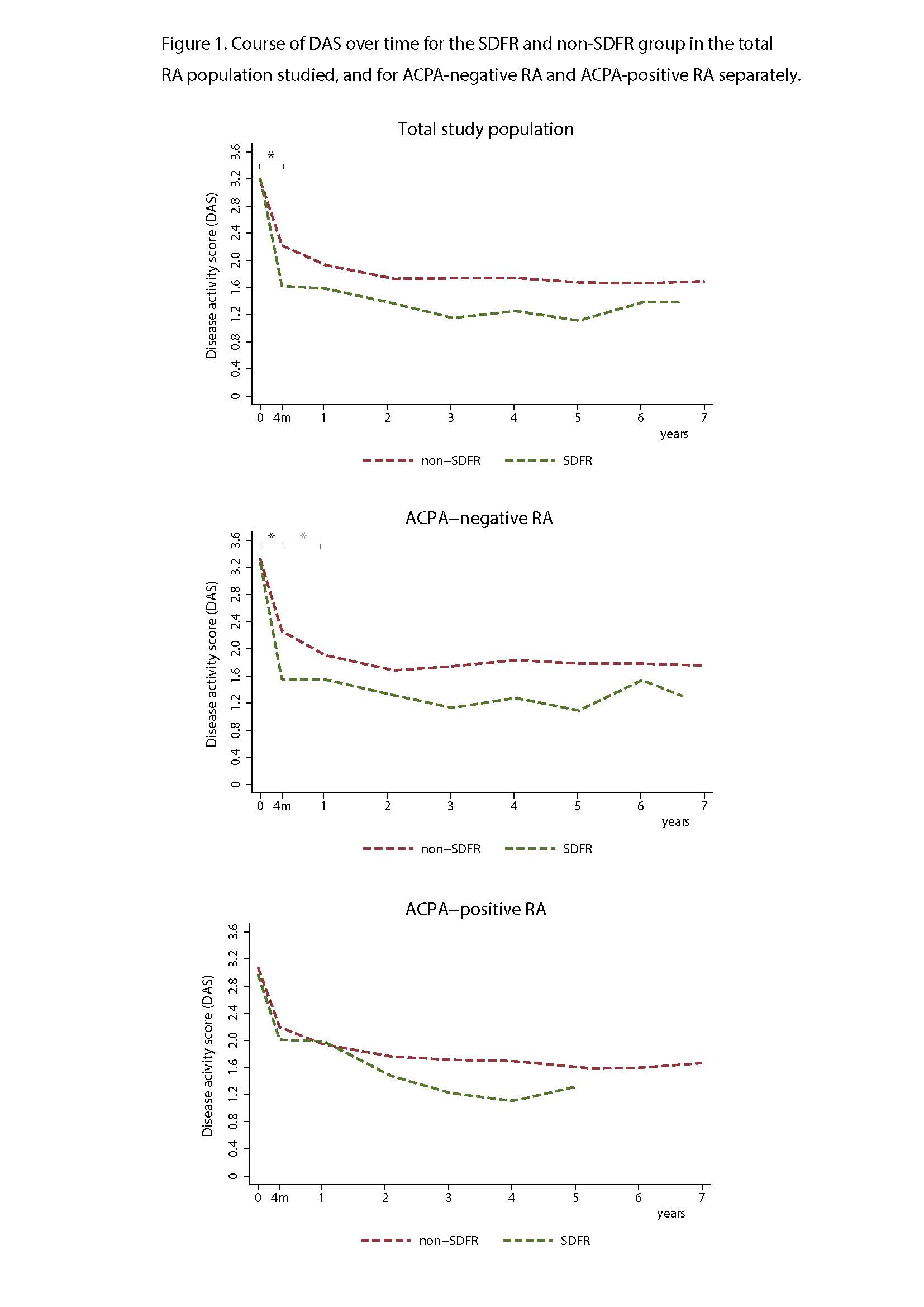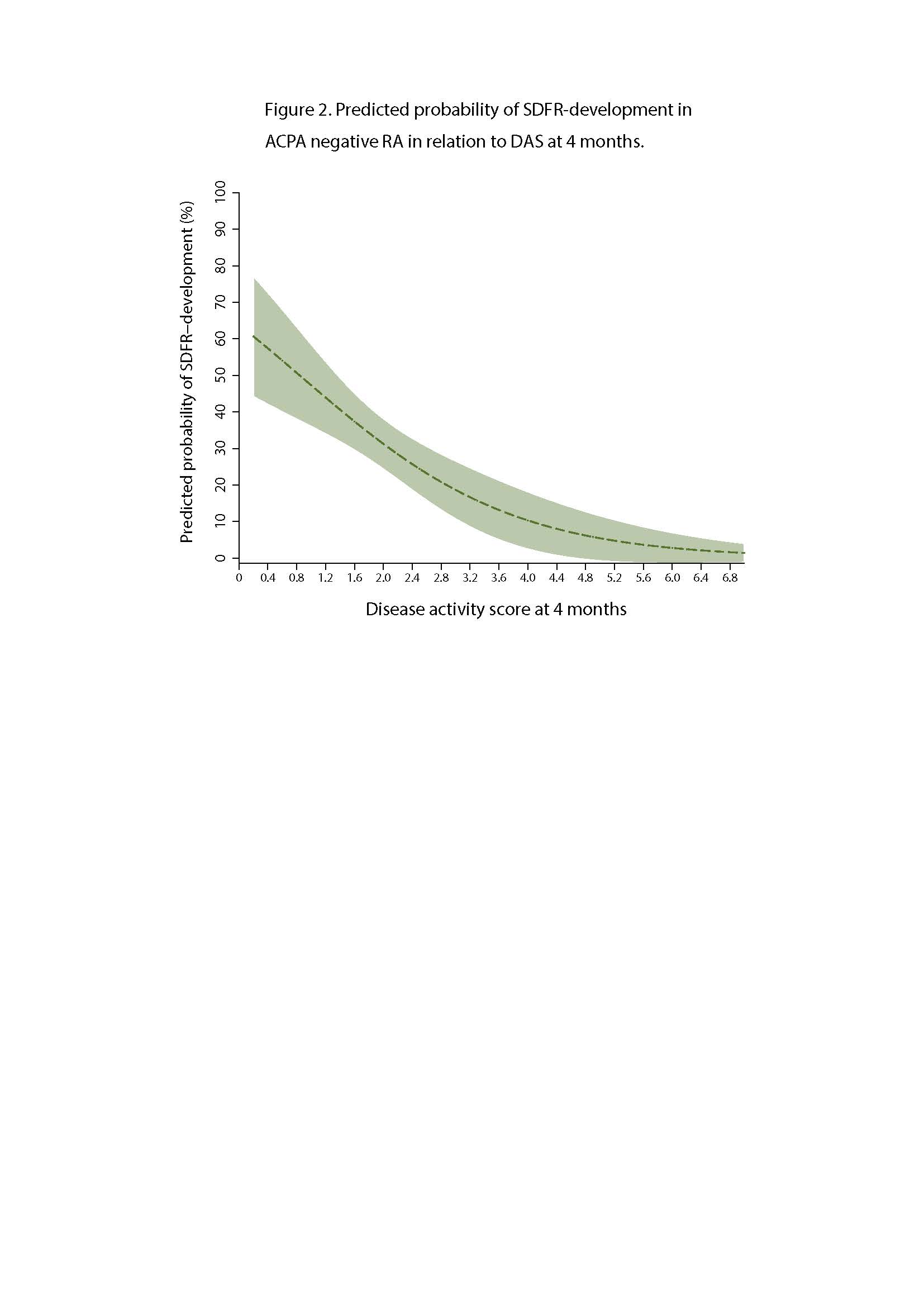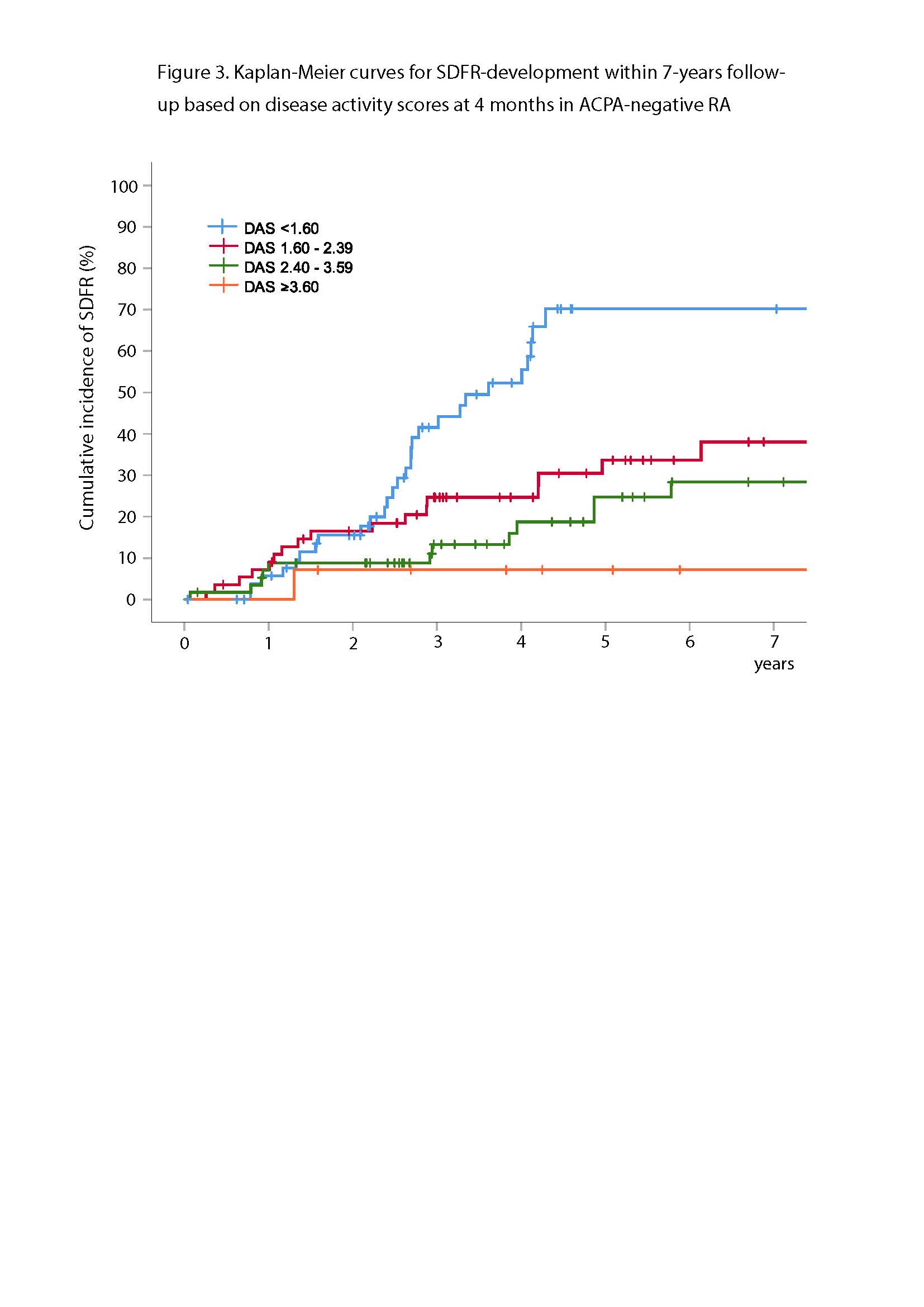Session Information
Date: Friday, November 6, 2020
Title: RA – Diagnosis, Manifestations, & Outcomes I: Pre-Onset & Early RA (0479–0483)
Session Type: Abstract Session
Session Time: 3:00PM-3:50PM
Background/Purpose: Sustained DMARD-free remission (SDFR) is increasingly achievable. The pathogenesis underlying SDFR-development is unknown and patient-characteristics at diagnosis poorly explain whether SDFR will be achieved. To increase the understanding, we studied the course of disease activity scores (DAS) over time in relation to SDFR-development. Subsequently, we explored whether DAS-course could be helpful identifying patients likely to achieve SDFR.
Methods: 772 consecutive RA-patients, promptly treated with csDMARDs (mostly methotrexate and treat-to-target treatment adjustments), were studied for SDFR-development (absence of synovitis, persisting minimally 12-months after DMARD-stop). The course of disease activity scores (DAS) were compared between patients with and without SDFR-development within 7-years, using linear mixed models, stratified for ACPA. The relation between 4-months DAS and the probability of SDFR-development was studied with logistic regression. Cumulative incidence of SDFR within DAS-categories (< 1.6, 1.6-2.4, 2.4-3.6, ≥3.6) at 4-months was visualized using Kaplan-Meier-curves.
Results: In ACPA-negative patients, those achieving SDFR showed a remarkably stronger DAS-decline within the first 4-months, compared to patients without SDFR; -1.73 units (95%CI,1.28-2.18) versus -1.07 units (95%CI,0.90-1.23)(p< 0.001). In APCA-positive patients such a difference was not observed. In ACPA-negative RA, DAS-decline in the first 4-months and absolute DAS-levels at 4-months (DAS4months) were equally predictive for SDFR-development. Incidence of SDFR in ACPA-negative patients was high (70.2%) when DAS4months was < 1.6, whilst SDFR was rare (7.1%) when DAS4months was ≥3.6. In ACPA-negative patients, those achieving SDFR showed a remarkably stronger DAS-decline within the first 4-months, compared to patients without SDFR; -1.73 units (95%CI,1.28-2.18) versus -1.07 units (95%CI,0.90-1.23)(p< 0.001). In APCA-positive patients such a difference was not observed. In ACPA-negative RA, DAS-decline in the first 4-months and absolute DAS-levels at 4-months (DAS4months) were equally predictive for SDFR-development. Incidence of SDFR in ACPA-negative patients was high (70.2%) when DAS4months was < 1.6, whilst SDFR was rare (7.1%) when DAS4months was ≥3.6.
Conclusion: In ACPA-negative RA, early response to treatment, i.e. a strong DAS-decline within the first 4-months, is associated with a higher probability of SDFR-development. DAS-values at 4-months could be useful for later decisions to stop DMARDs.
 Legend: Course of DAS over time of patients achieving sustained DMARD-free remission (SDFR) within 7 years of follow-up (n=149), and those not (n=623). In ACPA-positive patients, the line of the SDFR-group was restricted to 5 years follow-up because of insufficient data thereafter. Statistically significant differences in course of DAS over time, between the SDFR-group and non-SDFR-group, were indicated by with: * ACPA: anti-citrullinated protein antibody, DAS: Disease activity scores, RA: Rheumatoid arthritis, SDFR: Sustained DMARD-free remission.
Legend: Course of DAS over time of patients achieving sustained DMARD-free remission (SDFR) within 7 years of follow-up (n=149), and those not (n=623). In ACPA-positive patients, the line of the SDFR-group was restricted to 5 years follow-up because of insufficient data thereafter. Statistically significant differences in course of DAS over time, between the SDFR-group and non-SDFR-group, were indicated by with: * ACPA: anti-citrullinated protein antibody, DAS: Disease activity scores, RA: Rheumatoid arthritis, SDFR: Sustained DMARD-free remission.
 Legend: Predicted probability of achieving SDFR during follow-up in ACPA-negative RA, based on multivariate logistic model including DAS at 4 months, age, gender and symptom duration (table 2). For this graph, age, gender and symptom duration were set at the mean value of each covariable. An inverse relation is seen between DAS at 4-months and the predicted probability of achieving SDFR (within 7 years). ACPA: anti-citrullinated protein antibody, DAS: Disease Activity Score, SDFR: Sustained DMARD-free remission.
Legend: Predicted probability of achieving SDFR during follow-up in ACPA-negative RA, based on multivariate logistic model including DAS at 4 months, age, gender and symptom duration (table 2). For this graph, age, gender and symptom duration were set at the mean value of each covariable. An inverse relation is seen between DAS at 4-months and the predicted probability of achieving SDFR (within 7 years). ACPA: anti-citrullinated protein antibody, DAS: Disease Activity Score, SDFR: Sustained DMARD-free remission.
 Legend: Time-to-event was defined as time from 4-months visit until SDFR-development (yes/no), i.e. the absence of clinical arthritis for minimally 12-months after DMARD-stop. ACPA: anti-citrullinated protein antibody, DAS: Disease activity score, SDFR: sustained DMARD-free remission.
Legend: Time-to-event was defined as time from 4-months visit until SDFR-development (yes/no), i.e. the absence of clinical arthritis for minimally 12-months after DMARD-stop. ACPA: anti-citrullinated protein antibody, DAS: Disease activity score, SDFR: sustained DMARD-free remission.
To cite this abstract in AMA style:
Verstappen M, Niemantsverdriet E, Matthijssen X, le Cessie S, van der Helm - van Mil A. Early DAS Response After DMARD-start Increases Probability of Achieving Sustained DMARD-free Remission in Rheumatoid Arthritis [abstract]. Arthritis Rheumatol. 2020; 72 (suppl 10). https://acrabstracts.org/abstract/early-das-response-after-dmard-start-increases-probability-of-achieving-sustained-dmard-free-remission-in-rheumatoid-arthritis/. Accessed .« Back to ACR Convergence 2020
ACR Meeting Abstracts - https://acrabstracts.org/abstract/early-das-response-after-dmard-start-increases-probability-of-achieving-sustained-dmard-free-remission-in-rheumatoid-arthritis/
